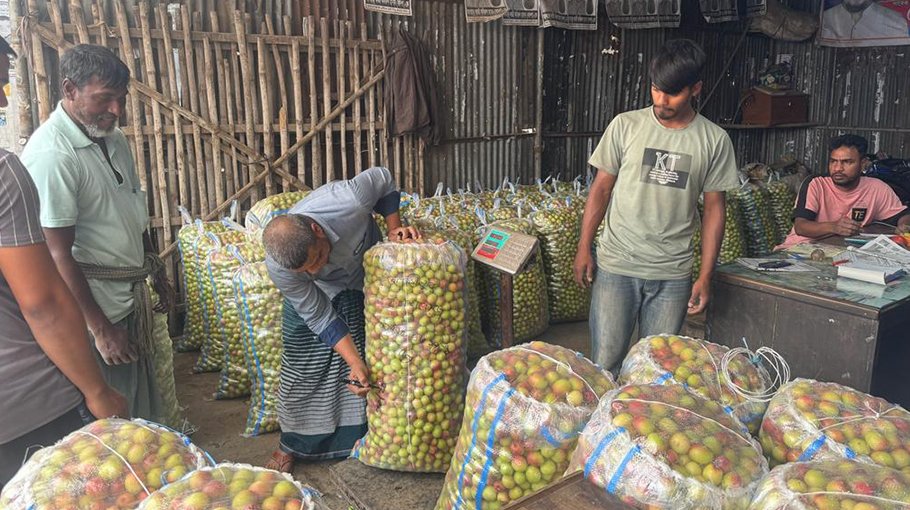Plum cultivation gains ground in Satkhira
Govt support can help thru export of the fruit

The soil of Satkhira is very suitable for kul cultivation. Since 2000, commercial cultivation of kul was started in this district and it is gradually increasing. In 2019, 550 hectares of land brought under of kul cultivation, but this season, 30 per cent increase this year and made it to 830 hectares of land.
Satkhira’s kul is in demand all over the country due to its unique taste and . At the same time, the farmers of Satkhira are also inclined towards commercial cultivation due to low cost and high profit. As a result, in the last four years, the cultivated has increases 30 percent.
On the one hand, the economy of Satkhira is getting better, on the other hand, many people are becoming self-sufficient by cultivating kul. As a result, cultivation of various varieties of kul is gradually increasing in Satkhira. Kul farmers of this district think that it is another sector with the potential to earn foreign currency with the proper support of the government.
Satkhira Department of Agricultural Extension said, this time in Satkhira there has been a bumper kul cultivation. A record amount of land has been cultivated in the current season compared to the previous season. This year, 830 hectares of land have been commercially cultivated with different varieties of kul. Among them, the yield of different varieties including Boll Sundari, Bharat Sundari, Thai Apple, Bau kul, Apple kul, Taiwan kul, Narikeli and Dhaka Ninety are in high yield The Agriculture Department is also expecting to produce 10 thousand metric tons of kul this season.
There are rows of kul gardens in different areas including Satkhira Sadar, Tala, Kalaroa, Debhata. The trees in these gardens are overflowing with various kinds of kul plums. The branches are bending under the weight of the tree. Meanwhile, varities kuls have already appeared in the market.
Cultivator Panchab Ali Biswas of Panchpara of Tala Upazila said that this year he cultivated kul on eight bighas land. It cost him about Tk six lakh. He has already started sale. This time he expects to sell Tk10 lakh.
He also said that at present Narkeli kul is being taken by traders in Dhaka at the rate of Tk 130. Apart from this, Apple Cool and Bau Cool are being sold at the rate of Tk 80 per kg.
Some kul farmers of the district said that it cost Tk 20 to 25 thousand to cultivate kul per bigha of land. There is a yield of Tk 65 to 75 thousand per bigha in the season. We are getting independence in hassle free cultivation. Besides, if the demand of the country is met, the farmers think that like mango, kul will potential sector to earn foreign currency by exporting them abroad.
Cultivator Nazrul Islam of Shakdah village of Patkelghata police station said that he has been cultivating kul for the past few years. His seven bigha garden has 500 cool trees of different varieties including Thai apple, Boll Sundari, Bilati, Kashmir apple, Desi apple, Thai apple, Coconut and Tok Bombay. These trees have been producing flowers for the past few years.
A buyer named Azharul said, Satkhira's kuls are very famous. However, in the hope of higher prices, many traders are selling kul before it ripens well. In particular, the common buyers do not understand whether the kuls are ripe or not. Many buyers lose enthusiasm.
Visitors can see in Sultanpur Barabazaar of Satkhira town Bilati kul is being sold at Tk 130 to 140 and Apple kul at Tk 80 to Tk 110 per kg. From dawn to midnight, the movement of kul traders from different districts of the country began. Buyers buy these and take them to different parts of the country.
Saiful Islam, Deputy Director of Satkhira Agricultural Extension Department (Khamarbari), said that the kul here is very tasty. Like mangoes, Satkhira's cla kul’s name is all over the country. Due to climate this areas kuls’ mature earlier than in other areas.
As a result, farmers get better prices. In addition, farmers can also grow non-food crops in the same land of kul or with kul without any impact on cropland.
He said, as the soil and climate here are favorable for cultivation, its cultivation is increasing. In the current season too, there has been a bumper kul production in Satkhira. Hope the farmers will be very profitable.



